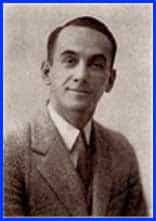God’s Great Blessing & Provision in Marriage
 Roy T. Brumbaugh, pictured at left, was raised in a Christian family with godly parents and proper training. He once said that his mother had prayed him into the Kingdom and then into the ministry and that his father had made generous provision for his education.
Roy T. Brumbaugh, pictured at left, was raised in a Christian family with godly parents and proper training. He once said that his mother had prayed him into the Kingdom and then into the ministry and that his father had made generous provision for his education.
Little was recorded of his early life, but it is known that he graduated from Northeast Manual Training High School in Philadelphia, Pennsylvania, on June 25, 1908, and commenced studies at Lehigh College the next year. He was there for one year and then went to Gettysburg College, where he graduated in 1912. It was during this time at Gettysburg that he met Margaret Valentine, who was the granddaughter of the President of the school. They were married on January 24, 1911.
She would prove to be the greatest single influence in his life and was the epitome of grace and friendliness to everyone she met. She had a quality of never getting upset about anything and always being positive and confident in the Lord’s blessing.
He did graduate studies at the University of Pennsylvania and the University of Illinois during 1914 and 1915. The Gettysburg yearbook, The Spectrum, states that he was a talkative, stuttering, effervescent youth who was very casual about his studies but that after his marriage, he became a candidate for valedictorian. His athletic achievements were legendary. He was the “shining star” and was elected captain of both the basketball and football teams. He was not large, but fiercely competitive and disciplined—qualities that would manifest themselves in his latter life In 1916, he commenced studies at Princeton Theological Seminary. He was a married man with children, and his education was largely financed by his father. At this time, Princeton Theological Seminary represented the conservative side of the above mentioned controversy and Union Theological Seminary the more liberal or modernist position. It was during his time at Princeton that Roy became involved in the issues of the day. The faculty at Princeton included men who were to be influential in the struggle, on both sides of the issues. They included J. Ross Stevenson, John D. Davis, Geerhardus Vos, W. P. Armstrong, Frederick W. Loetscher, Caspar Wistar Hodge, Benjamin B. Warfield, Robert Dick Wilson, J. Ritchie Smith, J. Gresham Machen, and William Brenton Green.
Words to Live By:
Regrettably, we could not locate a photograph of Mrs. Brumbaugh. Perhaps that is to be expected, and may even be fitting, for so often, those who are most influential are those same ones who work quietly in the background, never seeking attention for themselves.
Whoso findeth a wife findeth a good thing, and obtaineth favour of the Lord.—(Proverbs 18:22, KJV)
